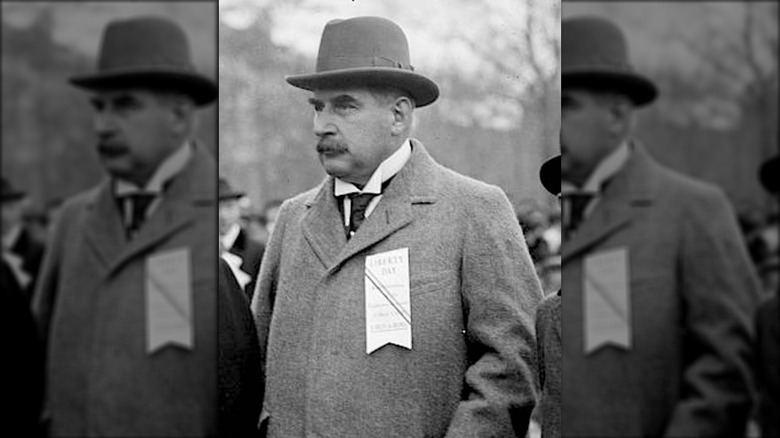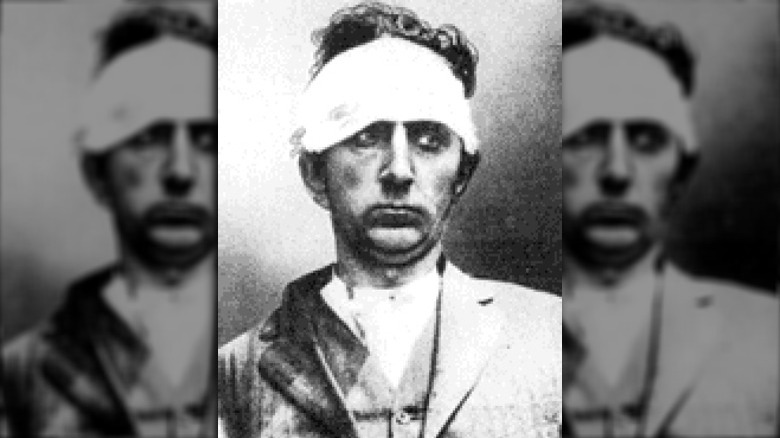The German Spy Who Tried To Murder J.P. Morgan Jr.
On July 3, 1915, a man forced his way into the home of millionaire J.P. "Jack" Morgan Jr., the son of banking magnate John Pierpont Morgan, and shot him twice. Fortunately, the bullets were fired randomly in the midst of a scuffle and inflicted only moderate injuries on the intended victim. Meanwhile, Morgan, his wife, and his butler subdued the intruder until police could turn up. The assailant would commit suicide in jail a few days later.
As it would later be revealed, the would-be murderer was a German spy, posing as an Ivy League German professor, whose real name was Erich Muenter. Using aliases, Muenter had taught at various universities across the country, leaving behind a trail of murders, bombings, and other efforts aimed at sabotaging the U.S. He would also be tied to a secret underground network of German spies and saboteurs working in the States.
This is the true story of Erich Muenter, the German spy who tried to murder J.P. Morgan Jr.
Piecing together Muenter's life before the J.P. Morgan assassination attempt
As Glen Cove Heritage noted, the details about how Erich Muenter wound up in the United States, and what he did before then, are sketchy at best. According to Info Please, he was born on March 25, 1871, in Hanover, Germany, and by 1889 had wound up in Chicago.
He apparently had a fondness for foreign languages, picking them up with relative ease and speaking them, English in particular, with such a slight German accent that most people who knew him thought he might have had a slight speech impediment.
By 1906, Muenter was teaching at Harvard. Also by that time, he was beginning to show signs that he might have some issues. Friends and colleagues would later report that he showed intense interests in mysticism and obscure philosophies, as well as books about mental illness.
Then his wife died of poisoning. Her family would later receive a pamphlet, purportedly sent by Muenter, in which he claimed that he promised to "annihilate" Chicago and Cambridge, Massachusetts, if the family continued accusing him of the crime. Also in that pamphlet, according to Hoosier State Chronicles, he allegedly claimed that he fled Massachusetts because the state inflicted severe punishments on Christian Scientists — a sect that eschews modern medical care — whenever someone died after having refused medical treatment.
The Morgan assassination attempt
After the murder of his wife, Erich Muenter disappeared for a few years, likely having fled to Mexico before working his way through a series of teaching jobs, under assumed names. Eventually, he wound up again in the Ivy League, teaching at Cornell under the name Frank Holt, according to Hoosier State Chronicles.
On July 3, 1915, "Holt" traveled to Glen Cove, New York, and managed to force his way into the home of J.P. "Jack" Morgan Jr., the son of the banking magnate of the same name. According to Glen Cove Heritage, once inside, Holt/Muenter made his way past the butler, weapons in hand, furiously chasing after his quarry, Mr. Morgan. At some point, he encountered Morgan's young children and pointed his weapon at them.
Eventually Morgan, his wife, and his butler all convened on the intruder to try to subdue him. In the scuffle, two shots rang out, striking Morgan. Meanwhile, the butler beat the assailant into submission with a lump of coal.
Police arrived and took the would-be assassin to jail. Morgan, for his part, luckily suffered only minor-to-moderate flesh wounds and was back to work within days.
After the Morgan assault
Once he was behind bars, Holt/Muenter initially refused to cooperate with police. According to The Harrisburg Telegraph, he would say only that he was a "Christian gentleman" who wanted to persuade Morgan to end the war between the U.K. and Germany.
Eventually, the full picture began to emerge. Authorities soon determined that Holt was actually Muenter, who was still wanted for the murder of his wife back in Cambridge. Meanwhile, authorities also discovered links to an underground network of German spies attempting to disrupt U.S. efforts to support Britain's war against Germany. Further, Muenter was almost certainly responsible for a bomb at the U.S. Capitol days before the Morgan assassination attempt, according to the Library of Congress, and he and his associates may also have been responsible for a bomb at New York police headquarters, also in the days before the Morgan assault.
On July 6, 1915, Erich Muenter took his own life in his jail cell. A day later, an explosion occurred on the ship SS Minnehaha, which was bound for England. The bomb failed to take any lives or do much damage to the ship. However, it also turned out to be Muenter's last act of sabotage, from beyond the grave, as he had warned authorities before his suicide that he had planted a bomb on a ship.
If you or anyone you know is having suicidal thoughts, please call the National Suicide Prevention Lifeline at 1-800-273-TALK (8255).



